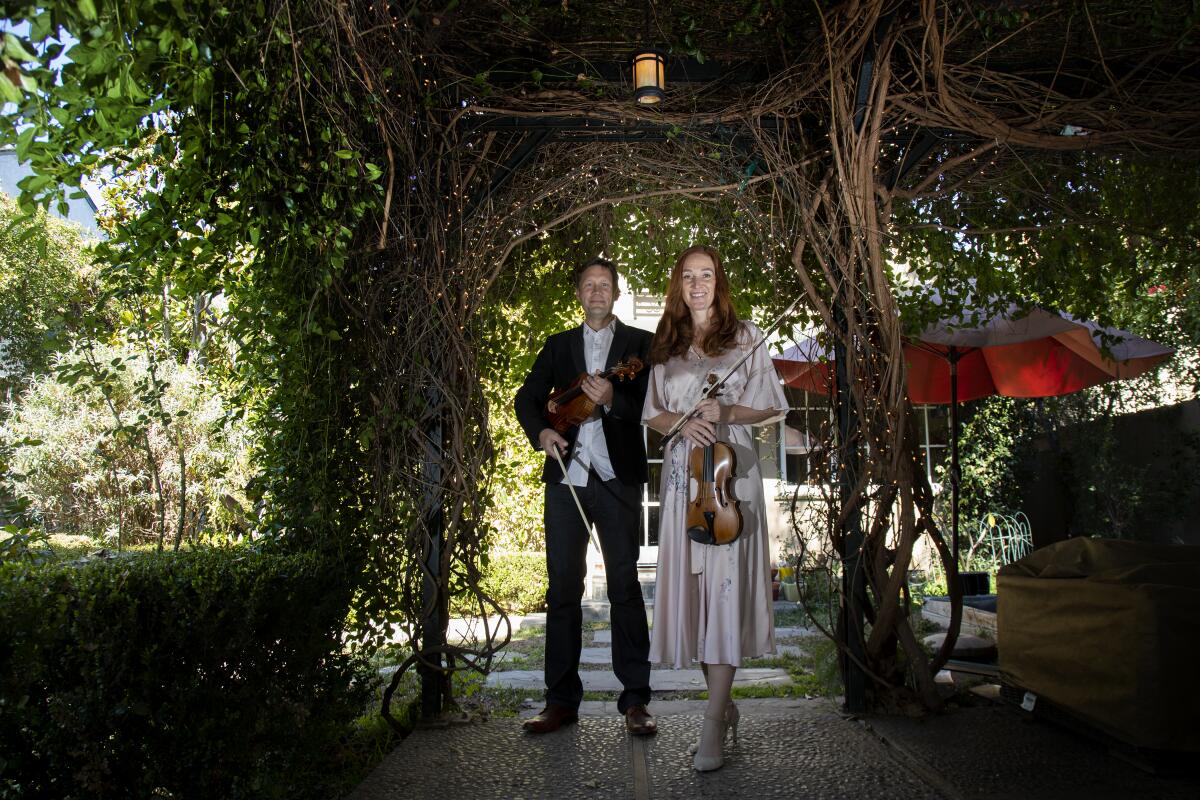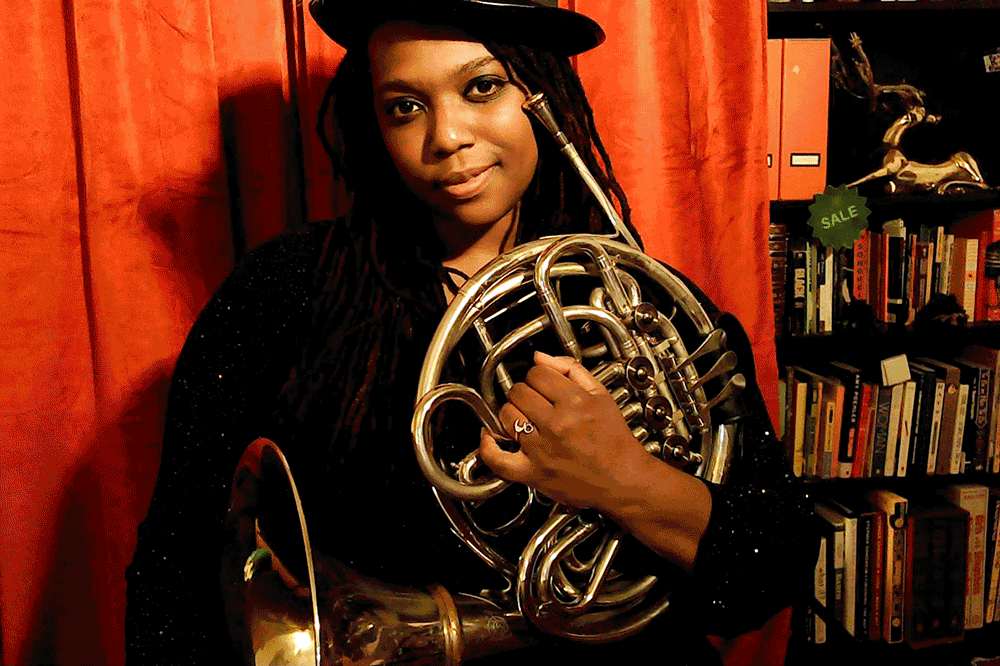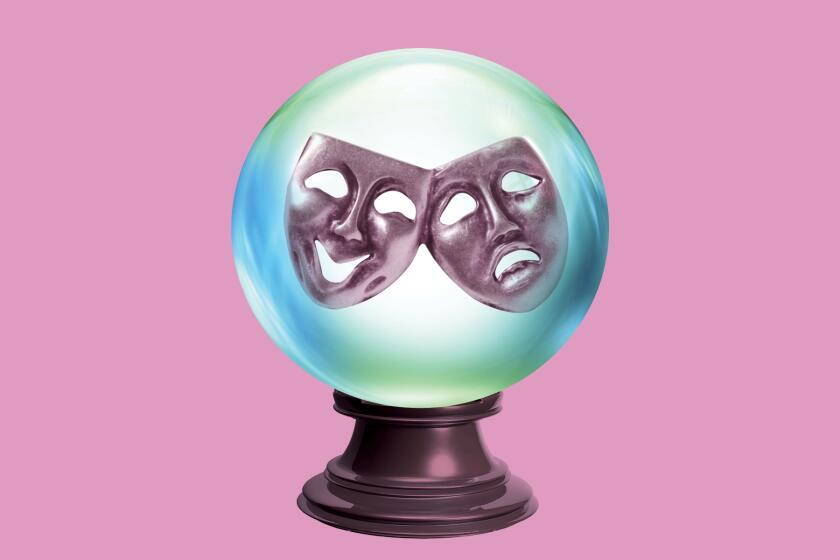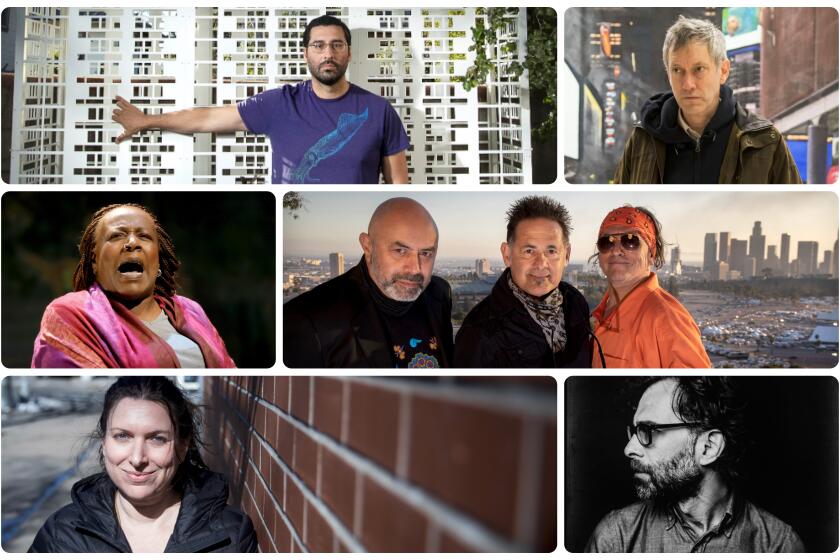Listen closely to ‘Tenet.’ You’ll hear their garage music

Los Angeles Chamber Orchestra musicians Tereza Stanislav and Robert Brophy turned their garage into a recording studio to stay afloat during the pandemic. They’re among 11 classical musicians from both coasts who shared their stories of struggle, survival and hope.
- Share via
It can’t be all bad when a soundtrack you worked on remotely during L.A.’s coronavirus shutdown gets nominated for a Golden Globe and is also a contender for an Oscar nod.
Husband-and-wife musicians Robert Brophy and Tereza Stanislav built a recording studio in their garage in April to contribute their parts to Ludwig Göransson’s score for Christopher Nolan’s sci-fi thriller “Tenet.”
Brophy, who plays viola, is a member of the Los Angeles Chamber Orchestra, and Stanislav, who plays violin, is the group’s assistant concertmaster. She is also a member of the Calder Quartet, which she joined in 2019.
They are parents of 5-year-old twins, and as the COVID-19 pandemic drags on, they have been helping their girls learn remotely — a task made extra challenging because the twins are enrolled in a Mandarin dual-language immersion school.
The upside? Mom and Dad are learning Mandarin too.
Violinist Melissa Tong landed her dream job playing a Broadway musical. Then the pandemic became the ultimate showstopper. She’s one of 11 classical musicians from both coasts who share their stories of struggle, survival and hope.
In March, when the coronavirus slammed the United States, and New York and L.A. largely shut down, commercial work for film and TV dried up, Brophy says.
“I remember looking at Tereza and thinking, ‘Well, we’re just not going to work for a year,’” he says. “It was extremely scary.”
The couple had savings that they hoped would sustain them. And they were thankful to discover that LACO had plans to continue operating online.
I was asked directly by a member of administration if we knew of anybody in the orchestra who might be in a bad financial situation. I thought that showed a deep level of caring.
— Los Angeles Chamber Orchestra assistant concertmaster, Tereza Stanislav
The group went on to announce a virtual season called “LACO Close Quarters,” which was to feature 16 episodes imagined and directed by designer and interdisciplinary artist James Darrah. The second half of that season, which paired music with films featuring animation, dancers and other artists, launched in February and will run through early June.
“We’re fortunate in the fact that LACO is small and they don’t have the massive overhead that a lot of larger groups have,” says Brophy. “I feel like they’ve really been able to pivot quite well to doing some more experimental online performances.”
Unlike the Los Angeles Philharmonic, LACO is not salaried and instead pays members per service. During a normal season, the orchestra typically would have about 35 presentations of some sort; during its pandemic virtual season, musicians are performing for fewer than half that — and in some cases just a couple programs. To further support members, the LACO board quickly established a health-and-welfare fund and pledged to equitably distribute what it could, when it could.
“I was asked directly by a member of administration if we knew of anybody in the orchestra who might be in a bad financial situation,” says Stanislav. “I thought that showed a deep level of caring.”
As the one-year anniversary of the COVID-19 pandemic arrives, we want to hear from Angelenos in the theater industry about what life has been like since.
Over the summer, film and TV projects began pulling musicians into studio sessions again, this time with elaborate COVID-19 protocols. But until then, Stanislav and Brophy had to record themselves at home. It presented a huge learning curve and a significant financial investment.
“The initial recordings were pioneering events from the production point of view, because it required every musician to have their own recording facility, which most don’t have,” Brophy says.
The World Health Organization announced the coronavirus outbreak had become a pandemic on March 11, 2020. Since then, the virus has seemingly touched all aspects of life in Southern California and beyond. The Times looks back on a full year of life in a pandemic.
He had to buy a more powerful computer, microphones, recording interfaces and software. He had to learn recording programs, and how to edit his own work.
“We basically had to become recording engineers,” he says.
To dampen the sounds of the neighborhood — lawn mowers, weed whackers, helicopters, a nest of parrots in the yard — they hung bulky blankets over their garage windows. Brophy recorded a piece of music for “Tenet” during a massive April rainstorm. The pitter-patter of drops could not be drowned out.
He wrote to Göransson, apologizing for the water noise.
“No, no, it’ll be fine,” he says the composer assured him — demonstrating the flexibility and good humor that would be required to work through much of the pandemic. “It’ll work great for this scene.”
Daniel Fish, Culture Clash, Dael Orlandersmith, Richard Maxwell, Annie Dorsen and Lars Jan reveal much loss — but also see a way forward.
More to Read
The biggest entertainment stories
Get our big stories about Hollywood, film, television, music, arts, culture and more right in your inbox as soon as they publish.
You may occasionally receive promotional content from the Los Angeles Times.















